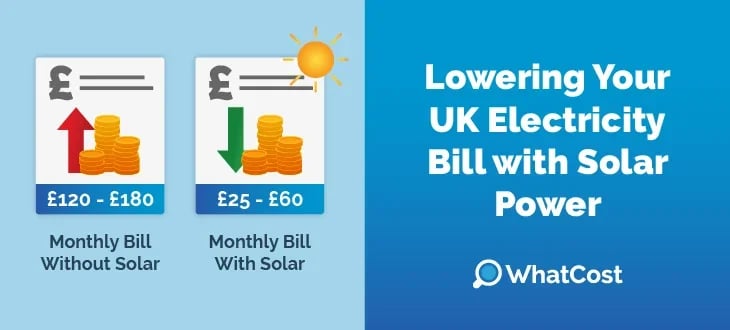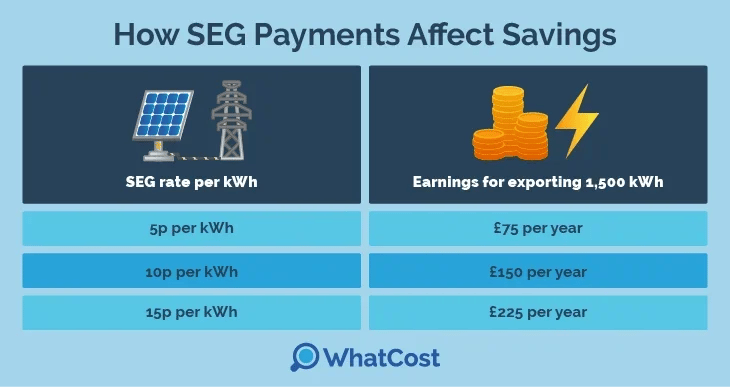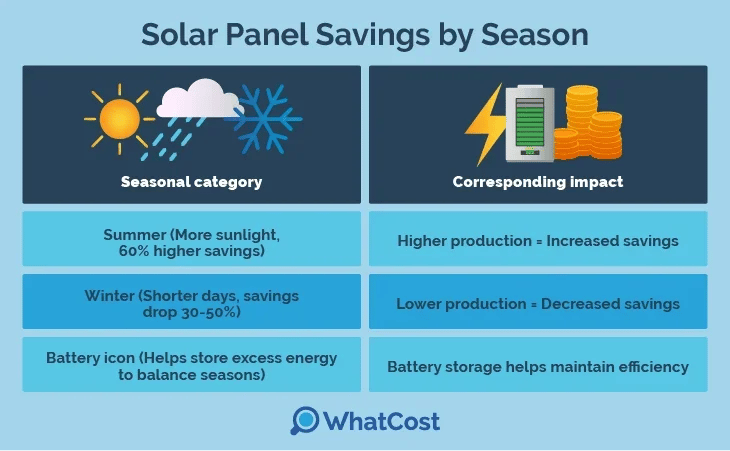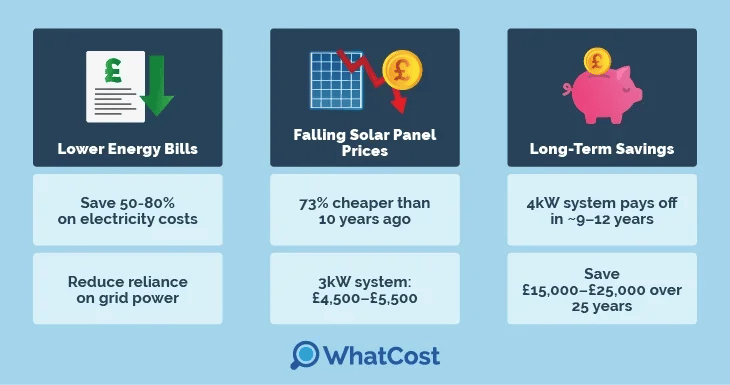Answer these simple questions and we will find you the BEST prices
Which type of solar quotes do you need?
It only takes 30 seconds
100% free with no obligation

Get up to 4 quotes by filling in only 1 quick form

Compare quotes and find yourself the best deal

Increase the value of your home by installing solar panels
- whatcost.co.uk
- Solar Panels
- Electricity Bill With Solar Panels
Average Monthly Electricity Bill With Solar Panels | UK Guide


- Adding solar panels can lower your monthly electricity bill by 50-80%, a great option for saving money, especially with unpredictable energy costs in the UK.
- 2026 UK’s monthly electric bills with solar panels cost £37 for a small 3-4 bedroom home compared to £145 for the same size without solar energy.
- The average annual savings for a 3-4 bedroom house using a 4-5kW solar system is £670, with lifetime savings of £16,750 or more. Larger homes save even more on electricity.
With a 9.4% increase in the UK’s domestic energy price cap (Ofgem), the average household energy bill now exceeds £1,849+ per year. Relying only on the grid leaves you vulnerable to rising costs. Switching to solar panels can lock in lower energy prices, reduce grid reliance and help you save money in the long run.
If you’re worried about rising energy prices, this article explains the average monthly electricity bill with solar panels. It covers key aspects of how they work, advantages, and factors influencing savings, helping you decide if solar energy fits your needs.
However, every home’s energy needs are different, so working with a professional ensures you get the best solar panels for your household, roof space, and location. Get up to 4 non-commitment solar panel quotes from our network of partners, saving you hours of research and allowing you to easily compare prices. Fill in the 30 second form below to start!
- Quotes from local installers
- Payment by finance available
- Save up to £915 per year
It only takes 30 seconds

How do solar panels work with your electric bill in the UK?
In the UK, solar panels work with your electricity bill by producing power from sunlight, lowering the amount you buy from your energy supplier. They convert sunlight into direct current (DC) electricity, which an inverter changes with alternating current (AC) electricity for home use.
If your solar panels produce more electricity than your home needs, the extra is sent to the grid through the Smart Export Guarantee (SEG). This guarantee allows your energy supplier to pay you per kilowatt-hour (kWh) of the excess you export.
However, in periods like nights or cloudy days, your panels may not produce enough electricity, so you’ll still need to switch back to the grid for power, and this will reflect in your monthly energy bill.
- SEG pays you for excess electricity your solar panels send to the grid.
- Payments vary by energy supplier and range from 3p-15p per kWh.
- Unlike the old Feed-in Tariff (FiT), rates are not fixed, so shop for the best deal.
What is the average monthly electricity bill with solar panels in the UK?
In the UK, with solar panels, the 2026 average monthly electricity bill is £22 - £46 for 1-5+ bedrooms home compared to £105 - £203 without solar. This means you can save up to £83 - £157 on electricity costs monthly, depending on your system size, energy usage, and export earnings.
| House size | System size | Electricity kWh use/yearly | Avg monthly bill w/o solar | Avg monthly w/ solar | Savings /Month |
|---|---|---|---|---|---|
| Small (1-2 bedroom) | 2kW - 3kW | 1,800 | £105 | £22 | £83 |
| Medium (3-4 bedroom) | 4kW - 5kW | 2,700 | £145 | £37 | £108 |
| Large (5+ bedroom) | 6kW+ | 4,100 | £203 | £46 | £157 |
These are estimates. Actual prices will depend on your system size, location, and energy usage.
Although the initial cost of solar panels is high, the payback period and lifetime savings outweigh them, making solar energy a worthwhile investment. Let’s explore:
- A 3-6kW system solar panel costs £4,500 to £10,500, including installation powering households with 2 to 5+ bedrooms.
- The payback period (break-even period) is 7 to 11 years, based on system cost and annual savings.
- Over 25 years, the total savings can reach £11,250 – £25,500+, allowing you to recoup initial costs and make a profit in the process.
However, you may wonder, how many solar panels do I need to reach these savings? The amount of panels depends on your energy use, roof space, and budget. A larger system can generate more electricity and cost more but lower your bills even further.
If you have solar panels, do you pay for electricity?
Yes, but much less. With solar energy, your grid usage drops by 50-80%, but you’ll still need grid electricity at night or in winter. Adding a battery can further reduce grid use by storing excess solar power. But without a battery, you may still use 35-50% of power from the grid. So, a well-sized solar system with battery storage can bring costs near zero. Some may pay just £20 - £50 per month, far below the national average of £105 - £203.
Which factors influence how much you save on electricity?
How much you save on electricity depends on a few factors, namely, your solar energy production, SEG tariffs, electricity costs, seasonal changes and battery storage. Let’s explore them;
Solar energy output
The more electricity your panels produce, the less you rely on expensive grid power. For instance, 3kW solar panels systems produce around 2,700 - 3,000 kWh per year, which can cover most or all of a medium-sized UK home’s electricity needs. This means lower bills and greater long-term savings, especially if you increase your daytime usage.
Smart Export Guarantee (SEG)

With the Smart Export Guarantee (SEG), any extra electricity your solar panels produce is sold back to the grid, which you get paid for unused energy. SEG rates vary between 5p and 15p per kWh, directly influencing your earnings. For instance,
- If you export 1,500 kWh per year at 10p per kWh, you can recover at least £150 for that year.
- If the rate is 5p per kWh, the same energy repays you £75.
Choosing a higher SEG rate has better returns and further lowers your overall electricity costs.
Electricity prices and tariffs
Your electricity savings depends on the rates when buying energy from the national grid. As of 2026, the UK’s energy price cap is set at £1,849 per year for an average household, increasing from the first quarter. This means finding the right tariff can greatly affect your savings.
- Standard variable tariffs (SVTs): These change with market prices and are controlled by the energy price cap. Your bills may rise or fall based on the wholesale costs.
- Fixed-rate tariffs: These lock in a set price per unit, protecting you from sudden price hikes. If energy prices rise, you save. Switching to a fixed deal could cut your yearly bill by up to £230 per year.
- Time-of-use tariffs: These tariffs charge different rates based on the time of day. Running appliances like dishwashers or washing machines overnight or during low-demand hours can reduce costs. Off-peak hours are midnight to 8 am.
Seasonal variations

The time of year directly affects how much you save on electricity. Solar panels produce up to 60% more electricity in summer months because of longer daylight hours, meaning you rely less on the grid and save more. However, during winter (December - February), shorter days lower how much energy the panels produce, which in turn increases your dependence on the grid and lowers savings too. Without a battery, your winter savings may drop 30-50% compared to summer.
Battery storage
Solar panel batteries store excess power produced from your panels. This allows you to use free solar energy even at night or in winter, lowering your dependence on expensive grid electricity. For instance;
- A 5kWh battery can cut grid dependence to 5-10%, saving an extra £300 - £600 per year.
- While battery lifespan is 10-15 years, you may need one replacement over a 25-year period to maintain savings.
Solar panels can cut electricity bills, but the right system makes all the difference. A well-matched setup reduces grid reliance, boosts SEG earnings, and maximises savings. But finding the best option takes expert input, and we can connect you with up to 4 trusted solar installers who can provide the best prices. Get free non-binding quotes with our 30 seconds form below. Click now.
- Quotes from local installers
- Payment by finance available
- Save up to £915 per year
It only takes 30 seconds

Advantages of solar panels
Solar panels help you save money and use less grid electricity.
- Lower energy bills: Most homes save £300 – £700 a year just by switching to solar.
- Big savings over time: Solar panels last 25+ years, saving you £783 to £1,567.
- Government support: You get 0% VAT on solar panels until 2027, plus possible grants for solar panels.
- Adds value to your home: Homes with solar panels sell for 2-4% more because buyers want lower bills.
- Better for the environment: A 4kW solar system cuts carbon emissions by 1.5 -2 tonnes a year.
- Less grid use: Solar panels cut your grid use by 50 – 80%. With a battery, you can store extra power, reducing your reliance on grid use. This means you’ll need very little electricity from suppliers.
Different types of solar panels offer various efficiencies and benefits, with monocrystalline panels being the most efficient but also the most expensive. Polycrystalline and thin-film options are cheaper options.
Are solar panels worth it?

Yes, solar panels are worth it. Solar panels help you save money, protect against rising energy prices, and use cleaner energy. Here’s why:
- Electricity prices rose to 9.4% from 2024 to 2025, and 6.4% in the 2nd quarter of 2025, which will likely increase more. Adding a solar panel system can reduce your reliance on the grid, saving you 50-80% on costs.
- Solar panel prices are now 50 - 73% cheaper than they were 10 years ago. A 3kW system powering a 1-2 bedroom home costs between £4,500 and £5,500, if not less.
- A 4kW solar system saves £1,304 a year, pays for itself in around 6 years and can save up to £32,608 over 25 years.
- You also pay 0% VAT on solar panels until 2027, making them even cheaper to install.
So, are solar panels worth it? Yes, they are, and with changes coming into effect, such as a 5% VAT in 2027 and rising energy costs, plus solar panel costs dropping by the year, there isn’t a better time to switch from your grid to solar energy.
To find the best prices with savings, we can connect you with up to 4 solar panel suppliers in your area. They can provide accurate prices, system options, and installation details in one go, saving you tons of research hours and back and forth with companies. Fill in the 30 seconds to receive up to 4 non-commitment solar panel quotes.
- Quotes from local installers
- Payment by finance available
- Save up to £915 per year
It only takes 30 seconds

FAQ
With solar panels, the average monthly electricity bill in the UK is £22 – £46 for house sizing ranging from 1- 5 bedrooms. Without them most homes pay £105 – £203 per month —about 50 – 80% more in cost.
Yes, you do, but a lot less. Solar panels cut your bill by 50 – 80%, but you may still need some grid electricity at night or in winter. A battery can store extra power, reducing your grid use even more.
Most homes save £83 – £157 per month in electricity. This depends on how much energy you use, your solar system size, and SEG payments for selling extra energy back to the grid.

Rousanna is an SEO content writer at WhatCost with a background in digital marketing and copywriting. She creates informative, well-researched home improvement content based on practical ideas to help readers make informed decisions.
- Average Monthly Electricity Bill With Solar Panels | UK Guide
- How do solar panels work with your electric bill in the UK?
- What is the average monthly electricity bill with solar panels in the UK?
- Which factors influence how much you save on electricity?
- Advantages of solar panels
- Are solar panels worth it?
- FAQ
- Quotes from local installers
- Payment by finance available
- Save up to £915 per year
It only takes 30 seconds

